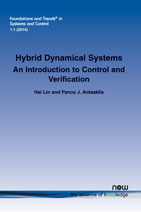Hybrid Dynamical Systems: An Introduction to Control and Verification
By Hai Lin, University of Notre Dame, USA, hlin1@nd.edu | Panos J. Antsaklis, University of Notre Dame , USA, antsaklis.1@nd.edu
Abstract
Hybrid dynamical systems are a class of complex systems that involve interacting discrete-event and continuous-variable dynamics. They are important in applications in embedded systems, cyber-physical systems, robotics, manufacturing systems, traffic management, bio-molecular networks, and have recently been at the center of intense research activity in the control theory, computer-aided verification, and artificial intelligence communities. This paper provides a tutorial introduction to this multidisciplinary research area. A number of fundamental topics, such as modeling, abstraction, verification, supervisory control, stability analysis, stabilization, and optimal control of hybrid systems are introduced and discussed. Additionally, more advanced topics are briefly discussed at the end of each chapter with references given for further reading.
Hybrid Dynamical Systems
The methods for hybrid systems are distributed across a wide spectrum, ranging from methods known in the discrete (cyber-)domain at one end, to traditional approaches for the continuous physical systems at the other. Rooted at opposite ends, both computer scientists and control theorists have made significant contributions to the field of hybrid systems by extending traditional methods from the traditional discrete or continuous domain to deal with hybrid systems. However, in general, there has been little work on integrating methods from these two domains. This is possibly because the formal methods pursued in computer science traditionally lie in the realm of discrete mathematics, while control theory approaches lie mainly in the realm of continuous mathematics.
A noticeable trend in the recent hybrid system literature emphasizes the synthesis of hybrid controllers for continuous or hybrid dynamical systems to satisfy complicated temporal logic specifications. This is known as symbolic control or hybrid supervisory control, which can be seen as a crosstalk between these two schools of thoughts.
Hybrid Dynamical Systems balances the emphasis on methods from both computer science and control theory, and gives the readers a complete picture of the whole field of hybrid dynamical systems. As well as providing a concise overview for a researcher in the field, the tutorial style makes it suitable for use in a course and by students.
